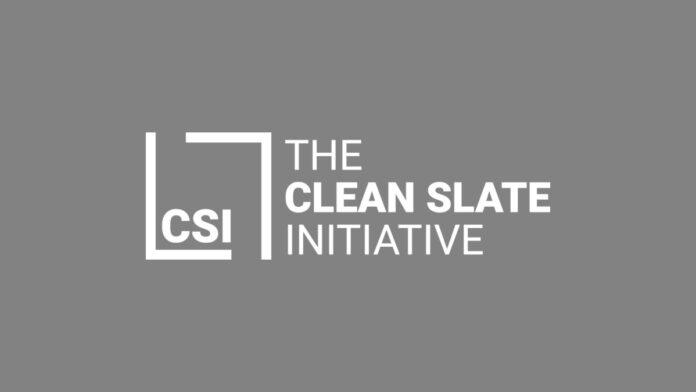Amid President Biden’s recent proclamation of April 2023 as the sixth annual “Second Chance Month” (with then President Trump declaring
the first in 2018), and as a result of Clean Slate legislation made possible by sustained bipartisan support at the local, state and federal levels, over one million people in America have received a second chance through automated record sealing of eligible arrest or conviction records. Millions more are in line to have their record automatically sealed as additional states implement policies already signed into law and more states continue to advance additional Clean Slate policies.
With a bipartisan policy model, The Clean Slate Initiative
works to update and expand eligibility for arrest and conviction record clearance for those remaining crime-free for a period of time. It further aims to raise awareness about the 1 in 3 Americans who live with an arrest or conviction record and, consequently, face barriers to meaningful employment, housing, education and other opportunities.
“We have reached the point where people are starting to experience the impact of Clean Slate policies,” said Meade. “The people of Pennsylvania and Utah are benefiting from a streamlined process that ensures all who are eligible receive a second chance. Several states are working towards implementing Clean Slate policies that have already been signed into law, putting millions of people on the path to having a fair chance to build a better future for themselves and their families.”
The NBA All-Star Weekend was on the heels of the recent Utah Clean Slate Summit co-hosted
by the Utah Jazz— an event that helped people not eligible for automated relief under Utah’s Clean Slate law navigate the petition-based expungement process. “Everyone deserves a second chance,” said Jazz owner Ryan Smith in a recent NBA.com report. “There are 400 [event attendees] who woke up this morning and decided that today’s a new day, and their lives are going to change. … They’re leaving the past behind, and that’s what all this is about.”
Underscoring the need for such reform, Utah Governor Spencer Cox weighed in during the recent Utah Clean Slate Summit co-hosted
by the Utah Jazz, stating, “Unfortunately, people pay their debt to society, and then that’s still hanging over their heads in ways that are unfortunate. We know better, we know we can do better…” Relatedly, Salt Lake City Mayor Erin Mendenhall also strongly advocates for ‘second chance’ chance, having cited, “We’re going to keep doing whatever we can and invent new ways to help remove barriers.”
Progress is underway. Pennsylvania and Utah enacted the first Clean Slate laws in 2018 and 2019, respectively, and the laws went into effect in 2019 (PA) and 2022 (UT). Since then, over 1.2 million Pennsylvanians have benefited from Clean Slate automated record sealing, according to Community Legal Services of Philadelphia,
and the Pennsylvania state court system database reports that over 43 million cases have been sealed. Other Utah-area reports
cite that “court system has received more than 216,000 records to be expunged. Roughly 60,000 of those have been processed.” Michigan, the next state that will implement a Clean Slate law, plans to initiate its automated record clearance process on April 11.
“The numbers are astounding, and it is no surprise that the number of people benefiting from Clean Slate laws is in the millions with just two states implementing a streamlined, automated system,” Meade noted. “Roughly one in three people in the United States have some kind of record. That is over 100 million people in this country who are denied access to opportunities. It is so common, and we must understand that the second chances we are talking about are for our friends, family, neighbors and loved ones.”
Most states already have a process for sealing arrest and conviction records. However, the process is often expensive and complicated, requiring time off work and having an attorney. As a result, fewer than 10%
of people eligible to have a record sealed receive record relief following a state’s waiting period for eligibility. State-level Clean Slate campaigns connect lawmakers, state agencies, and other stakeholders with technical and policy experts to identify pathways to transition from antiquated petition-based processes to an automated clearance process that automatically seals records for those who are eligible.
Over the next six (6) years, The Clean Slate Initiative has a strategy to:
- Support the implementation in states that have already passed Clean Slate laws to ensure all who are eligible have a shot at redemption.
Pass Clean Slate legislation in 15 states, which, once implemented, will result in:
- 6-8 million people with fully cleared records
- 10-14 million people with partially cleared records
- Build support for future passage of Clean Slate policies in all other states.
The benefits of Clean Slate go beyond having a transformational impact on individuals and families directly benefiting from record relief. Communities are safer when people have meaningful employment, housing, education, and other opportunities. Research from the University of Michigan
found that sealing records increases employment status and earnings for people with cleared records in that state. The same research found that record clearance was associated with significantly reduced re-offense rates, lowering them to below those of people who do not have a record.
“When we find ways to work together, we have the ability to create change. The only way that change lasts is if it’s bipartisan—and that’s why Clean Slate will have such a lasting impact,” said David Safavian, member of the Clean Slate Initiative Advisory Board and general counsel of the American Conservative Union Foundation and Conservative Political Action Conference (CPAC). “Ensuring that people have a second chance and access to meaningful opportunities after they have paid their debt to society increases community safety, boosts local economies, and alleviates workforce demands.”
About the Clean Slate Initiative
The Clean Slate Initiative
is a non-profit organization that uses a bipartisan policy model to update and expand eligibility for arrest and conviction record clearance if a person stays crime-free for a period of time. Our vision is that everyone in America should have a fair opportunity to work, have a safe home, take care of their families, and contribute to their community. The Clean Slate Initiative’s efforts unite businesses, advocates, community members, and impacted people across the country to ensure that conviction and non-conviction records are no longer a life sentence to poverty and that past mistakes will not forever define people’s futures.
Additional Data & Resources
More than 100 million people living in the United States have an arrest or conviction record (Table 19. Criminal Justice Information Services Division, FBI; 2020).
Background checks are widely used and can prevent people from accessing opportunities. Background checks are used by:
- 94% of employers use background checks when hiring (National Consumer Law Center. 2019)
- 90% of landlords use background checks prospective tenants (National Criminal Law Center. 2019)
- 72% of colleges and universities use background checks on prospective students (Stewart & Uggen. 2020)
More than 44,000 state and federal regulatory restrictions limit the ability of people with a record to access meaningful opportunities to build a better life (National Inventory of Collateral Consequences of Conviction).











